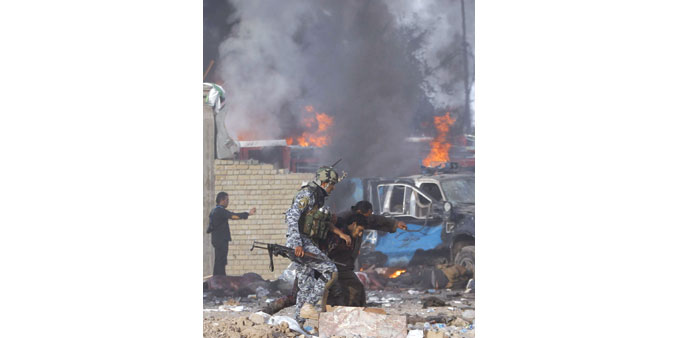Agencies
Baghdad
Twin bombings by a powerful Sunni jihadist group against a Shia political rally in Baghdad killed 28 people yesterday as the country gears up for parliamentary elections next week.
Campaigning is at a fever pitch ahead of Wednesday’s polls, the first since US troops withdrew in late 2011 and with Prime Minister Nuri al-Maliki bidding for a third term amid the worst violence since a brutal Sunni-Shia sectarian war.
A car bomb followed by a suicide attack hit the rally for the Sadiqun bloc, the political wing of the Asaib Ahel al-Haq (League of the Righteous) militia, said interior ministry spokesman Brigadier General Saad Maan.
Dozens more were wounded.
“A cowardly terrorist attack targeted one of the electoral gatherings in the Sinaa stadium in Baghdad,” Maan said in a statement.
The League of the Righteous, a Shia militia blamed in the past for killing US soldiers and kidnapping Britons, has been linked to groups fighting mostly Sunni rebels in Syria, whose civil war has split the Middle East’s sectarian communities, particularly in multi-confessional Iraq.
The Islamic State of Iraq and the Levant claimed the attack, saying it was to avenge the League’s involvement in neighbouring Syria.
ISIL, itself fighting in Syria, made the claim in a statement posted on jihadist forums several hours after the attack, but said the bloodshed was caused by two suicide bombers.
“Abu Aisha al-Iraqi and Abu Osama al-Iraqi... managed to enter a gathering of infidels... during their parade... and blew up their suicide belts,” said the statement attributed to ISIL.
The claim derisively referred to the group targeted as the League of the Vain.
The attack was “in revenge for what the Safavid militias are doing in Iraq and Sham (the Levant), killing and torturing and displacing Sunnis”. It used a pejorative term for Iraq’s Shia majority, linking it to the Safavid empire that once ruled neighbouring, predominantly Shia Iran.
Asaib’s main leader Qais al-Khazaali had just delivered a speech at the rally accusing some politicians of aiding terrorism and vowed his movement was ready for any action by ISIL.
“To all ISIL ... we are ready. We are prepared,” he said. “We are the defenders of this country. You will never reach us.”
He added: “If ISIL is the sickness, were are the medicine.”
Maliki is seeking re-election on Wednesday, with little sign of a let-up in the bloodshed and the country still looking to rebuild after decades of conflict and sanctions that have left the economy and infrastructure in dire need of repair.
A number of Shia blocs are battling Maliki for votes in his traditional heartland of central and southern Iraq.
They include Sadiqun but also the Ahrar movement, which is linked to powerful cleric Moqtada al-Sadr, and the Citizens bloc, a formerly powerful political group seen as close to Iran.
Asaib Ahel al-Haq joined the political process in early 2012, shortly after the departure of US forces from Iraq.
Washington has accused Iran of funding and training the group, a charge Tehran denies.
The group broke away from Sadr’s Mahdi Army in 2004, and has also been blamed for the kidnap of British IT consultant Peter Moore and his four bodyguards in 2007.
Moore was released, the only member of the group to survive.
The group is also suspected of being behind an attack in January 2007 in which a US soldier was killed and four others abducted and later found dead.

